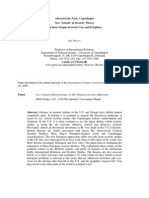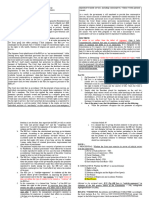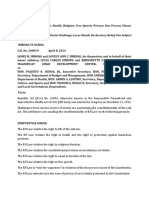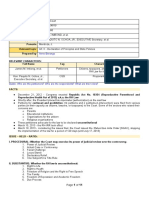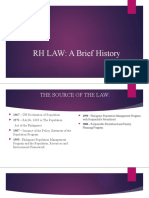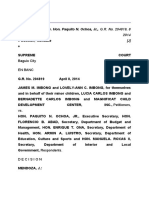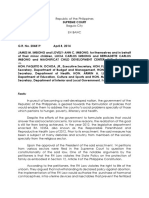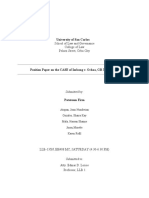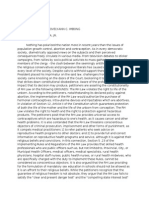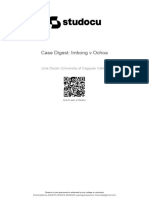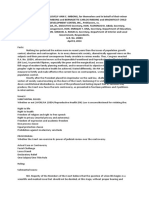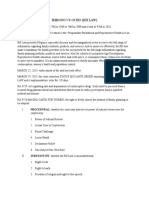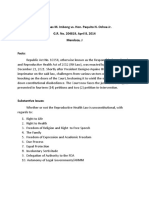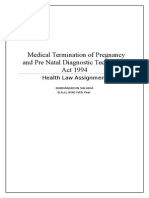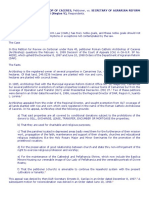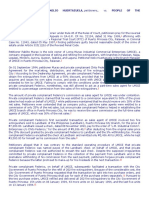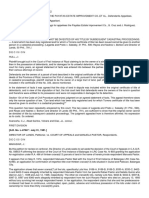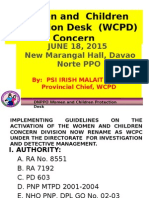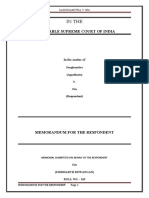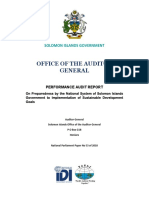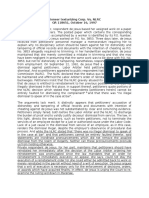Imbong V. Ochoa Title
Imbong V. Ochoa Title
Uploaded by
Nerry Neil TeologoCopyright:
Available Formats
Imbong V. Ochoa Title
Imbong V. Ochoa Title
Uploaded by
Nerry Neil TeologoOriginal Description:
Original Title
Copyright
Available Formats
Share this document
Did you find this document useful?
Is this content inappropriate?
Copyright:
Available Formats
Imbong V. Ochoa Title
Imbong V. Ochoa Title
Uploaded by
Nerry Neil TeologoCopyright:
Available Formats
53. IMBONG V.
OCHOA
TITLE JAMES M. IMBONG and LOVELY-ANN C. IMBONG,
for themselves and in behalf of their minor
children, LUCIA CARLOS IMBONG and
BERNADETTE CARLOS IMBONG and MAGNIFICAT
CHILD DEVELOPMENT CENTER, INC., Petitioners,
vs.
HON. PAQUITO N. OCHOA, JR., Executive
Secretary, HON. FLORENCIO B. ABAD, Secretary,
Department of Budget and Management, HON.
ENRIQUE T. ONA, Secretary, Department of
Health, HON. ARMIN A. LUISTRO, Secretary,
Department of Education, Culture and Sports and
HON. MANUELA. ROXAS II, Secretary, Department
of Interior and Local Government, Respondents.
GR NUMBER 204819
DATE APRIL 8, 2014
PONENTE MENDOZA, J
NATURE/KEYWORDS
SPECIAL CIVIL ACTIONS in the Supreme Court.
Certiorari and Prohibition; and PETITIONS-IN-
INTERVENTION.
FACTS In 2012, the Philippines enacted the Responsible
Parenthood and Reproductive Health Act of 2012,
known as the Reproductive Health Law (RH Law),
which guaranteed universal and free access to
nearly all modern contraceptives to all citizens,
including those living in poverty, through
government health centers. The law also mandated
reproductive health education in government
schools and recognized the right to post-abortion
care as part of the right to reproductive healthcare.
The RH Law was immediately challenged by various
religious and conservative groups. The Supreme
Court of the Philippines issued an order preventing
the law from going into effect pending a final
judgment. The RH Law was challenged on the
grounds that it violated a range of constitutional
rights, such as the rights to life, health, freedom of
religion and speech, and privacy.
ISSUE(S) Whether or not (WON) RA 10354/Reproductive
Health (RH) Law is unconstitutional for violating
the:
1. Right to free speech
RULING(S) The RH Law violates the right to free speech. To
compel a person to explain a full range of family
planning methods is plainly to curtail his right to
expound only his own preferred way of family
planning. The petitioners note that although
exemption is granted to institutions owned and
operated by religious groups, they are still forced
to refer their patients to another healthcare facility
willing to perform the service or procedure.
The OSG also assails the propriety of the facial
challenge lodged by the subject petitions,
contending that the RH Law cannot be challenged
"on its face" as it is not a speech regulating
measure. The Court is not persuaded.
In United States (US) constitutional law, a facial
challenge, also known as a First Amendment
Challenge, is one that is launched to assail the
validity of statutes concerning not only protected
speech, but also all other rights in the First
Amendment. These include religious freedom,
freedom of the press, and the right of the people
to peaceably assemble, and to petition the
Government for a redress of grievances. After all,
the fundamental right to religious freedom,
freedom of the press and peaceful assembly are
but component rights of the right to one's freedom
of expression, as they are modes which one's
thoughts are externalized. In this jurisdiction, the
application of doctrines originating from the U.S.
has been generally maintained, albeit with some
modifications. While this Court has withheld the
application of facial challenges to strictly penal
statutes, it has expanded its scope to cover
statutes not only regulating free speech, but also
those involving religious freedom, and other
fundamental rights. Verily, the framers of Our
Constitution envisioned a proactive Judiciary, ever
vigilant with its duty to maintain the supremacy of
the Constitution.
You might also like
- Campanilla Notes PDFDocument104 pagesCampanilla Notes PDFtwenty19 law85% (13)
- Aberystwyth, Paris, Copenhagen New 'Schools' in SecurityDocument23 pagesAberystwyth, Paris, Copenhagen New 'Schools' in SecurityAmina Mostefa Della100% (1)
- RH Bill Reproductive Health Bill Republic Act No. 10354 Also Known As The Responsible Parenthood and Reproductive Health Act of 2012-1-1 1Document14 pagesRH Bill Reproductive Health Bill Republic Act No. 10354 Also Known As The Responsible Parenthood and Reproductive Health Act of 2012-1-1 1orroskunNo ratings yet
- Lord Macaulay's Address To The British Parliament 2 February, 1835Document1 pageLord Macaulay's Address To The British Parliament 2 February, 1835Arundada Gaikwad (M.G)100% (4)
- Statcon - Atty Lood NotesDocument22 pagesStatcon - Atty Lood NotesKaiNo ratings yet
- Submitted To: Sir Imran Asghar Submitted By: Waqas Saeed Roll No: B-21730 (Section A) Subject: International Law Topic: TreatiesDocument5 pagesSubmitted To: Sir Imran Asghar Submitted By: Waqas Saeed Roll No: B-21730 (Section A) Subject: International Law Topic: TreatiesSeemab MalikNo ratings yet
- Rizal LawDocument14 pagesRizal LawPaula ElambayoNo ratings yet
- Imbong Vs OchoaDocument47 pagesImbong Vs OchoaleoNo ratings yet
- Imbong v. OchoaDocument5 pagesImbong v. OchoaRukmini Dasi Rosemary GuevaraNo ratings yet
- Imbong V Ochoa DigestDocument14 pagesImbong V Ochoa DigestmNo ratings yet
- Case-Digest-Imbong-V-Ochoa Part 2Document6 pagesCase-Digest-Imbong-V-Ochoa Part 2Kate Hazzle JandaNo ratings yet
- IMBONGDocument60 pagesIMBONGCharmaine Bagui MagsinoNo ratings yet
- Case Digest Assigned Part 2 - AndalahaoDocument2 pagesCase Digest Assigned Part 2 - AndalahaoVincent Ariel AndalahaoNo ratings yet
- Rule 20Document16 pagesRule 20Noel SihNo ratings yet
- Imbong Vs Ochoa Case DigestDocument15 pagesImbong Vs Ochoa Case DigestBenedick LedesmaNo ratings yet
- RH Law g10Document68 pagesRH Law g10Alfin Jeffbrice BengueloNo ratings yet
- Imbong v. Ochoa Freedom of ReligionDocument2 pagesImbong v. Ochoa Freedom of ReligionRoward100% (1)
- 5 Imbong Vs Ochoa JRDocument11 pages5 Imbong Vs Ochoa JRSarah BuendiaNo ratings yet
- Imbong Vs OchoaDocument5 pagesImbong Vs OchoaAnonymous e3d4NYgnNKNo ratings yet
- Case Digest Imbong V OchoaDocument6 pagesCase Digest Imbong V OchoaSittie Rania CandotanNo ratings yet
- Case Digest - Imbong vs. OchoaDocument5 pagesCase Digest - Imbong vs. OchoaAngelo Joseph AgustinNo ratings yet
- RH LAW REPORT GroupDocument13 pagesRH LAW REPORT GroupGrace ArandaNo ratings yet
- 5 Imbong v. Ochoa, April 8, 2014Document162 pages5 Imbong v. Ochoa, April 8, 2014GERALD LUDASNo ratings yet
- Imbong v. Ochoa DIgestDocument6 pagesImbong v. Ochoa DIgestALMIRA SHANE Abada MANLAPAZNo ratings yet
- Rule 20 Precautionary PrincipleDocument53 pagesRule 20 Precautionary PrinciplesakuraNo ratings yet
- Rule 20 Precautionary PrincipleDocument53 pagesRule 20 Precautionary PrinciplesakuraNo ratings yet
- Position PaperDocument11 pagesPosition PaperKaren RefilNo ratings yet
- Imbong vs. Ochoa DigestDocument5 pagesImbong vs. Ochoa DigestClaire CulminasNo ratings yet
- Position Paper - ARTIFICIAL BIRTH CONTROL METHODSDocument17 pagesPosition Paper - ARTIFICIAL BIRTH CONTROL METHODSPatricia MelendrezNo ratings yet
- 11 Imbong vs. Ochoa 721 Scra 146Document4 pages11 Imbong vs. Ochoa 721 Scra 146Beatta Ramirez0% (1)
- Case Digest Imbong V Ochoa 1Document6 pagesCase Digest Imbong V Ochoa 1Jessica AgustinNo ratings yet
- Medical Termination of Pregnancy Act 1971Document24 pagesMedical Termination of Pregnancy Act 1971ramshaNo ratings yet
- Petitioners: James M. Imbong and LovelyDocument3 pagesPetitioners: James M. Imbong and LovelyKang MinheeNo ratings yet
- RH LawDocument11 pagesRH LawInah Manalang- VillaNo ratings yet
- Imbong v. Ochoa (G.R. No. 204819)Document1 pageImbong v. Ochoa (G.R. No. 204819)Patrick Dag-um MacalolotNo ratings yet
- G.R. No. 204819 Case DigestDocument2 pagesG.R. No. 204819 Case DigestCee Gee Doltz Bacud100% (1)
- RH Law Case DigestDocument4 pagesRH Law Case DigestRitchen FeelsNo ratings yet
- Imbong V OchoaDocument2 pagesImbong V OchoaGayeGabrielNo ratings yet
- Imbong V OchoaDocument5 pagesImbong V OchoaJohn Mark PabeNo ratings yet
- Imbong Vs OchoaDocument6 pagesImbong Vs OchoaEzekiel Japhet Cedillo EsguerraNo ratings yet
- Imbong, Et Al v. OchoaDocument2 pagesImbong, Et Al v. OchoaAlexandraSoledadNo ratings yet
- Legal Logic MidtermsDocument11 pagesLegal Logic MidtermsAgie MarquezNo ratings yet
- University of The Philippines College of LawDocument5 pagesUniversity of The Philippines College of Lawrm2803100% (1)
- RH Law 2Document17 pagesRH Law 2Davie PascuaNo ratings yet
- Case DigestDocument3 pagesCase Digestkass aceraNo ratings yet
- Case Digest 1 - Roe Vs Wade FactsDocument46 pagesCase Digest 1 - Roe Vs Wade FactsAronJamesNo ratings yet
- Defensor Santiago vs. ComelecDocument33 pagesDefensor Santiago vs. ComelecMarjorie G. EscuadroNo ratings yet
- Imbong Vs OchoDocument7 pagesImbong Vs OchoSherleen Anne Agtina DamianNo ratings yet
- Imbong Vs OchoaDocument8 pagesImbong Vs OchoamerebearooNo ratings yet
- Imbong vs. Ochoa Case DigestDocument6 pagesImbong vs. Ochoa Case DigestRaakista18 SWNo ratings yet
- Imbong Vs OchoaDocument17 pagesImbong Vs OchoaMARIBETH BROWN-OLIVERNo ratings yet
- Position PaperDocument4 pagesPosition PaperBaka Ero100% (1)
- Consti Digest b3Document59 pagesConsti Digest b3NocQuisaotNo ratings yet
- RA 10354, Also Known As "The Responsible Parenthood and Reproductive Health Act of 2012", HasDocument9 pagesRA 10354, Also Known As "The Responsible Parenthood and Reproductive Health Act of 2012", HascianNo ratings yet
- Critique by Atty. Cristina A. Montes of The UP Primer On Legal Issues On Reproductive Rights - Constitutional Law IssuesDocument9 pagesCritique by Atty. Cristina A. Montes of The UP Primer On Legal Issues On Reproductive Rights - Constitutional Law IssuesCarlos Antonio P. PaladNo ratings yet
- Diadem Pearl R. Mansayon LLB 1Document5 pagesDiadem Pearl R. Mansayon LLB 1dempe24No ratings yet
- Human Rights in Healthcare IndustryDocument25 pagesHuman Rights in Healthcare IndustryNICKY SAMBONo ratings yet
- Im Bong Vs Ochoa DigestDocument12 pagesIm Bong Vs Ochoa DigestTherese JavierNo ratings yet
- 56.1 Imbong Vs Ochoa DigestDocument7 pages56.1 Imbong Vs Ochoa DigestEstel TabumfamaNo ratings yet
- Medical Termination of Pregnancy and Pre Natal Diagnostic Techniques Act 1994Document30 pagesMedical Termination of Pregnancy and Pre Natal Diagnostic Techniques Act 1994Anonymous tOgAKZ8No ratings yet
- Position Paper RH BillDocument14 pagesPosition Paper RH BillClaire DumdumaNo ratings yet
- Imbong vs. OchoaDocument2 pagesImbong vs. OchoaRon AceNo ratings yet
- Carlos Legaspi JR.: When Does Life Begin?Document9 pagesCarlos Legaspi JR.: When Does Life Begin?Steven OrtizNo ratings yet
- Constitutional Law Case Digest - Castillo, Jovelio D. JD1CDocument6 pagesConstitutional Law Case Digest - Castillo, Jovelio D. JD1CJd CastilloNo ratings yet
- RH BILL Presentation1Document18 pagesRH BILL Presentation1EveBNo ratings yet
- Healthcare as a Human Rights Issue: Normative Profile, Conflicts and ImplementationFrom EverandHealthcare as a Human Rights Issue: Normative Profile, Conflicts and ImplementationSabine KlotzNo ratings yet
- Take Home Quiz No 2Document2 pagesTake Home Quiz No 2Nerry Neil TeologoNo ratings yet
- Cebu Winland v. OngDocument4 pagesCebu Winland v. OngNerry Neil TeologoNo ratings yet
- Ilusorio VS CaDocument2 pagesIlusorio VS CaNerry Neil TeologoNo ratings yet
- CasesDocument1 pageCasesNerry Neil TeologoNo ratings yet
- Cases Atp Nov 25Document59 pagesCases Atp Nov 25Nerry Neil TeologoNo ratings yet
- Heirs of Yusingco v. BusilakDocument7 pagesHeirs of Yusingco v. BusilakNerry Neil TeologoNo ratings yet
- DecsDocument19 pagesDecsNerry Neil TeologoNo ratings yet
- Spouses Teves v. Integrated CreditDocument10 pagesSpouses Teves v. Integrated CreditNerry Neil TeologoNo ratings yet
- Rubin v. Coors BrewingDocument2 pagesRubin v. Coors BrewingNerry Neil TeologoNo ratings yet
- The Indigenous Peoples' Rights Act of 1997Document6 pagesThe Indigenous Peoples' Rights Act of 1997Nerry Neil TeologoNo ratings yet
- Tuazon v. TuazonDocument6 pagesTuazon v. TuazonNerry Neil TeologoNo ratings yet
- Soriano V BautistaDocument3 pagesSoriano V BautistaNerry Neil TeologoNo ratings yet
- Sales CasesDocument75 pagesSales CasesNerry Neil TeologoNo ratings yet
- Roman Catholic Archbishop of Caceres, Petitioner, vs. Secretary of Agrarian Reform and DAR REGIONAL DIRECTOR (Region V), RespondentsDocument38 pagesRoman Catholic Archbishop of Caceres, Petitioner, vs. Secretary of Agrarian Reform and DAR REGIONAL DIRECTOR (Region V), RespondentsNerry Neil TeologoNo ratings yet
- Murao - de Castro CompilationDocument85 pagesMurao - de Castro CompilationNerry Neil TeologoNo ratings yet
- Supervisor Janet Nguyen's Presentation On Orange County Grand Jury Report.Document20 pagesSupervisor Janet Nguyen's Presentation On Orange County Grand Jury Report.PayersandProvidersNo ratings yet
- GR No. 211465 People v. CasioDocument28 pagesGR No. 211465 People v. CasioGem SNo ratings yet
- LTD CasesDocument45 pagesLTD CasesMuhammad FadelNo ratings yet
- Dayag Vs CanizareDocument5 pagesDayag Vs CanizareCarina Amor ClaveriaNo ratings yet
- Definitions of SocialWork AReviewDocument24 pagesDefinitions of SocialWork AReviewarunaiskrkNo ratings yet
- Judith Grossman - A Mother, A Feminist, Aghast - WSJDocument3 pagesJudith Grossman - A Mother, A Feminist, Aghast - WSJMordechai GilbertNo ratings yet
- Int Bus CH 9Document10 pagesInt Bus CH 9carolorhurNo ratings yet
- Right To InformationDocument10 pagesRight To Informationjahanzaib yasinNo ratings yet
- GE Energy Parts Inc VsDocument7 pagesGE Energy Parts Inc VsAnant ShrivastavaNo ratings yet
- Anarcho-Capitalism: Anarcho-Capitalism Is A Political Philosophy and Modern School of Anarchist ThoughtDocument25 pagesAnarcho-Capitalism: Anarcho-Capitalism Is A Political Philosophy and Modern School of Anarchist ThoughtYoshitomo MoriokaNo ratings yet
- Poncet Eloïse - 260854213 - Final ExamDocument10 pagesPoncet Eloïse - 260854213 - Final ExamEloïse PoncetNo ratings yet
- World HungerDocument16 pagesWorld Hungerapi-255065289No ratings yet
- Century Fox Vs Ca Full CaseDocument8 pagesCentury Fox Vs Ca Full CaseKristanne Louise YuNo ratings yet
- Thayer The Great Game - Belt and Road Initiative & Blue Dot NetworkDocument2 pagesThayer The Great Game - Belt and Road Initiative & Blue Dot NetworkCarlyle Alan ThayerNo ratings yet
- Donation Is SolelyDocument2 pagesDonation Is SolelyAnthony Angel Tejares50% (2)
- Orientation of WCPD New Policewomen Without TrainingsDocument23 pagesOrientation of WCPD New Policewomen Without TrainingsCarol Jacinto80% (5)
- In Forma Pauperis Fraud by The Judiciary of The County of Lancaster and The Common Pleas Court October 9, 2015Document65 pagesIn Forma Pauperis Fraud by The Judiciary of The County of Lancaster and The Common Pleas Court October 9, 2015Stan J. Caterbone33% (3)
- Arab Israel Conflict 4thDocument26 pagesArab Israel Conflict 4thyk374628No ratings yet
- Knowledge Diplomacy in ActionDocument36 pagesKnowledge Diplomacy in ActionAininditaNo ratings yet
- In The: Honorable Supreme Court of IndiaDocument13 pagesIn The: Honorable Supreme Court of IndiaSaurabh BaraNo ratings yet
- PM Reyes Bar Reviewer On Taxation I (v.3) PDFDocument158 pagesPM Reyes Bar Reviewer On Taxation I (v.3) PDFBoom Manuel100% (1)
- SDG Insulele SolomonDocument110 pagesSDG Insulele SolomonstiribuneNo ratings yet
- Featured Panels and EventsDocument4 pagesFeatured Panels and EventsWriting DemocracyNo ratings yet
- Pioneer Texturizing Corp Vs NLRCDocument1 pagePioneer Texturizing Corp Vs NLRCVin LacsieNo ratings yet

